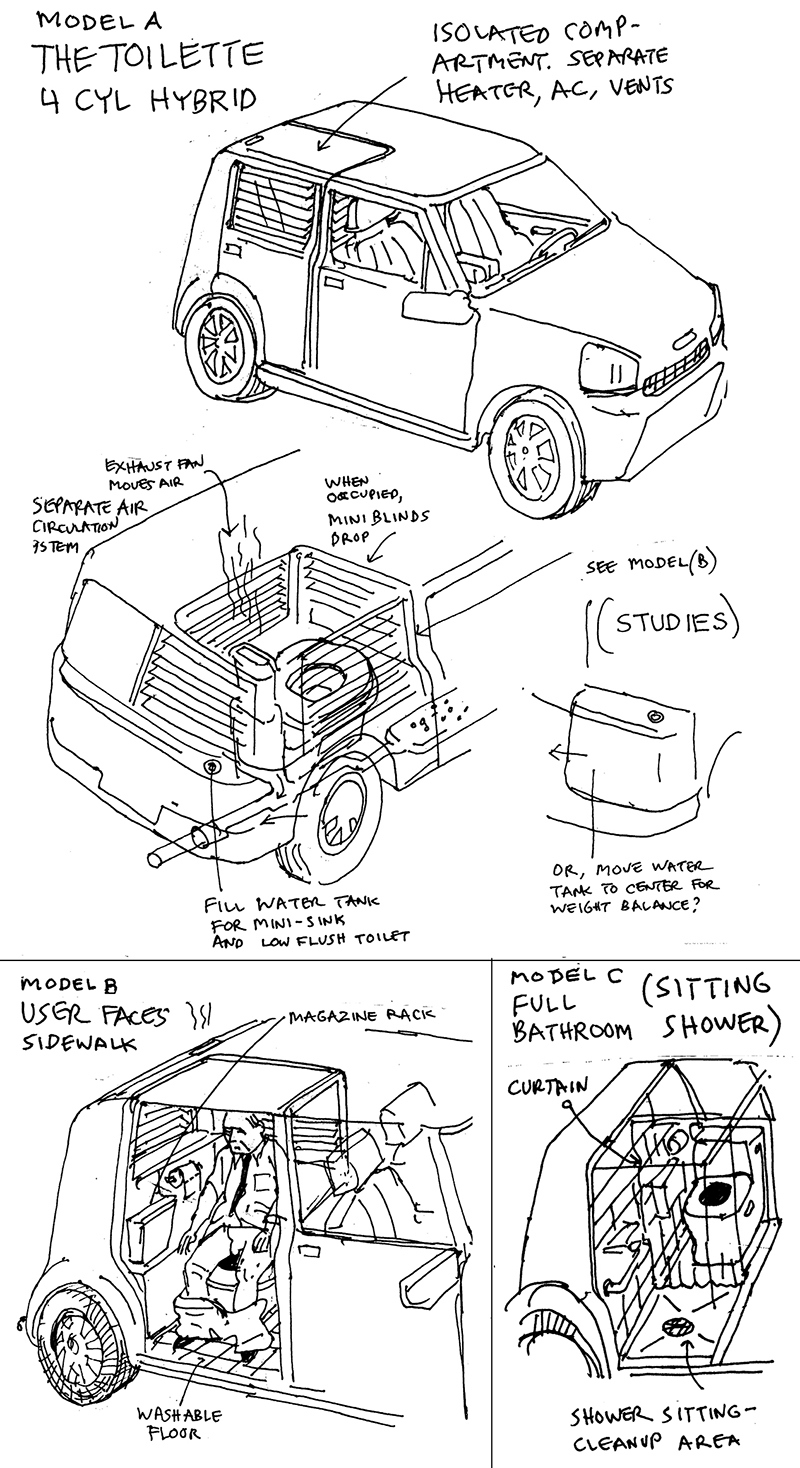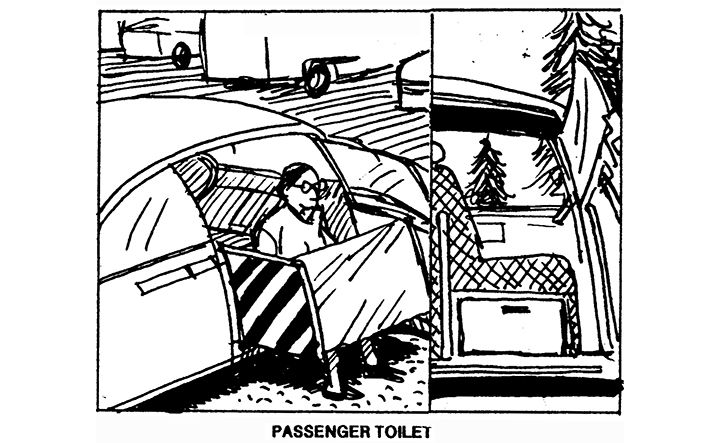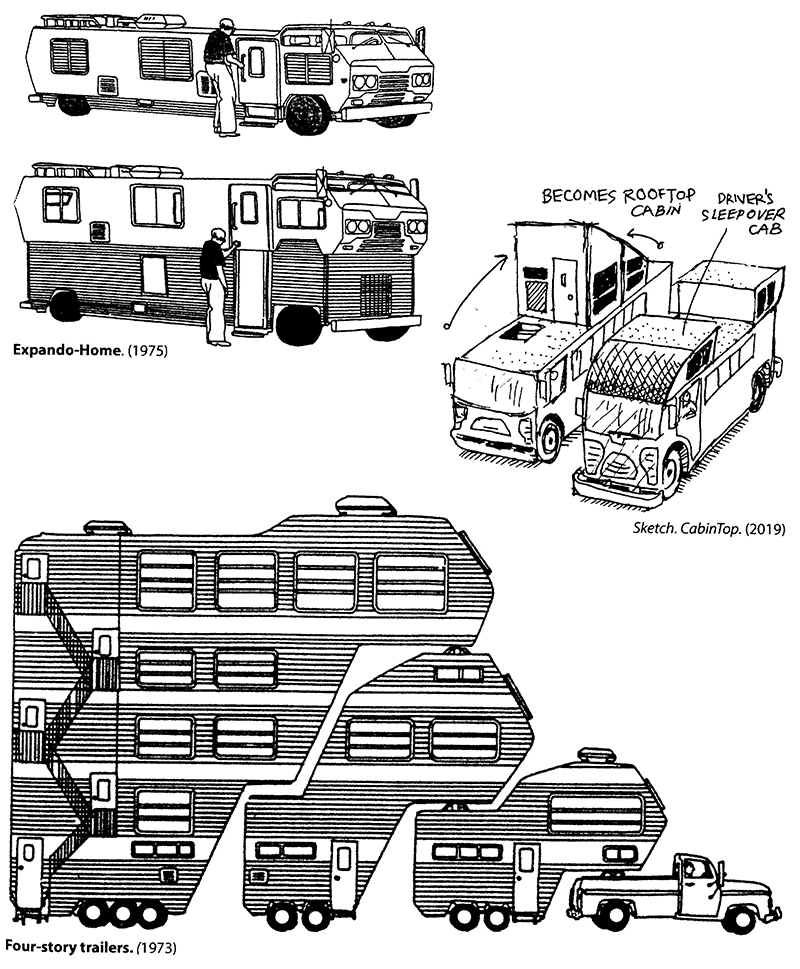
Steven M. Johnson (proprietor of The Patent Depending Press) is in his 81st year, and has the ambition of inventor but as artist and humorist he is thirty (no, fifty) years younger. Perhaps making ludicrous inventions keeps the soul, if not the body, young. In any case, Johnson was a moderately talented classroom artist in high school in Northern California and at Yale. Yet all his cartoons were rejected by The Yale Record, the university’s humor magazine. Today he is considered a futurist, however, he did not invent anything until he was 35 years old, when, in March, 1974 as cartoonist for Sierra Magazine, he accepted an assignment to create 16 hypothetical future RVs, capable of “polluting and destroying the nation’s beautiful, sensitive backcountry.” He conceived 109 detailed concept sketches and in the process discovered that he ‘loved inventing imaginary products!’ Since then, his business card has described his occupation at “Possibilitist.” From 1974-95 he maintained a side business, producing odd product concept illustrations for magazines, which got odder and odder. In 1995, he took a job as a “futurist” at Honda R&D in Southern California and quit the invention-cartooning side business. He took it up again in May, 2009 after being written about by New York Times columnist Allison Arieff. He cannot seem to stop the flow of ideas. And I simply love possible impossibilities. I talked to Johnson recently about the reality of his absurdity and his new book Vehicles of the Imagination.
(His books include What the World Needs Now, Ten Speed Press, 1984 and Public Therapy Buses, St. Martin’s Press, 1991.
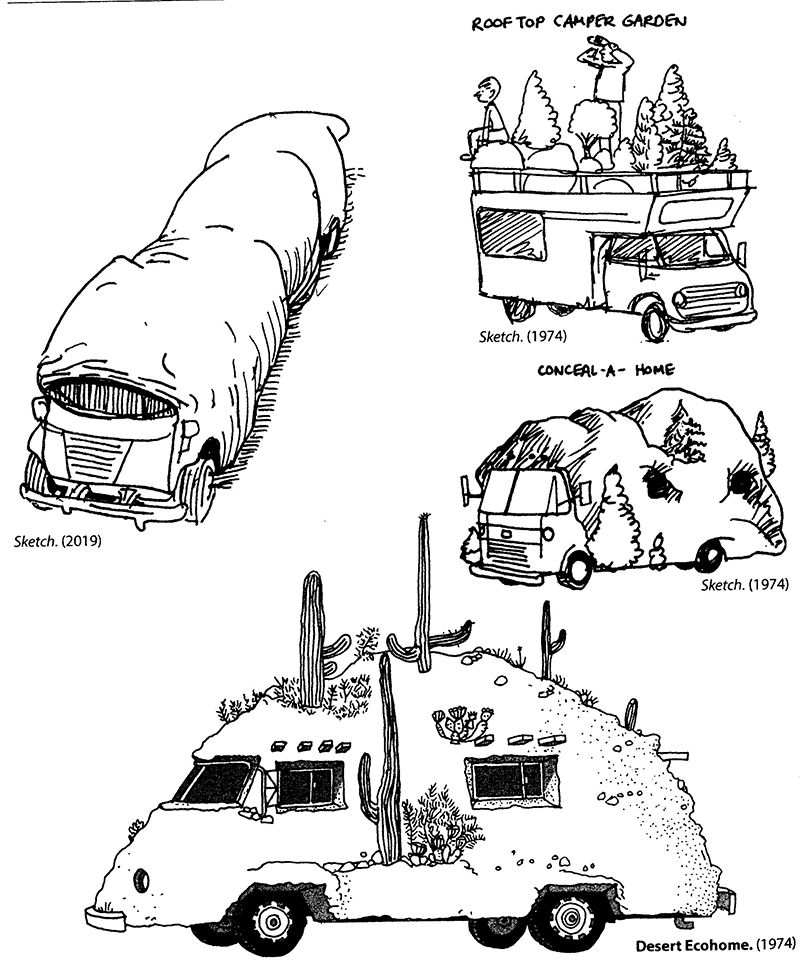
Steven Heller: What are you? An inventor, artist, humorist or all of the above?
Steven M. Johnson: As a young child and teenager I was not a tinkerer or inventor. Even now, my son, Alex S. Johnson, says that I am not truthfully an inventor of actual products, but instead that I desire to project and insert my own attitudes about social issues and consumerism, using the medium of illustration. Alex chose the title for my 2013 TEDx talk: “Inventing Without a Purpose.” Inventiveness as a process, mood, and attitude thrills me. I enter my own private world. I work alone without boss, budget, deadline, focus groups, meetings, or even the need to have my “products” make sense, engineering-wise. I believe my addiction to thinking up products is the result of having learned meditation in the late 1960s. The Yoga Sutras prescribe the means for bringing one’s mind to a halt to calm down internal mental chatter. This practice has the effect for me of stimulating the very type of mental churning, undisciplined, and rapid imagining, that meditation practices are supposed to quell!
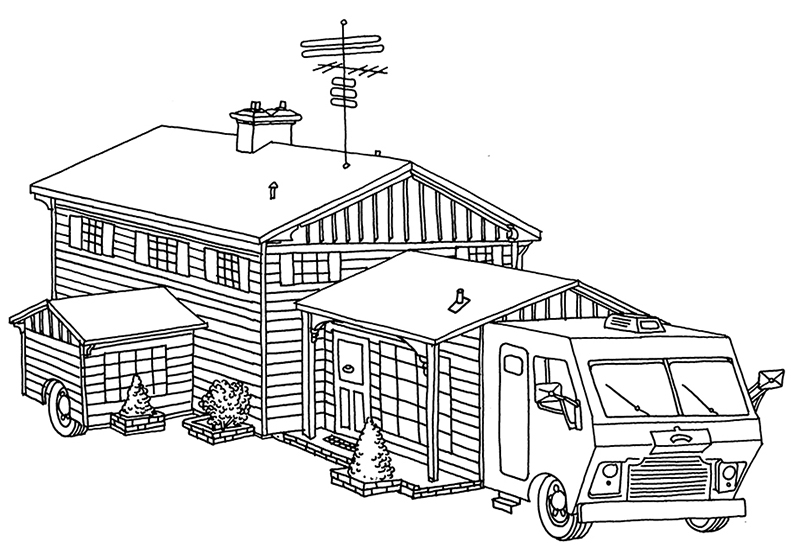
SH: I wish some of your devices were doable. Your mind is so fertile, why don’t you do something great for humankind?
SMJ: I have an uncommon aversion to being practical and to making money from my product ideas. Attempts have been made to get me to focus on bringing particular ideas into reality and I have always resisted those. The process of thinking up new ideas without the need to clarify, complete or patent the idea is what I enjoy.
I am able to turn my Invention Thinking Mode on or off at will.
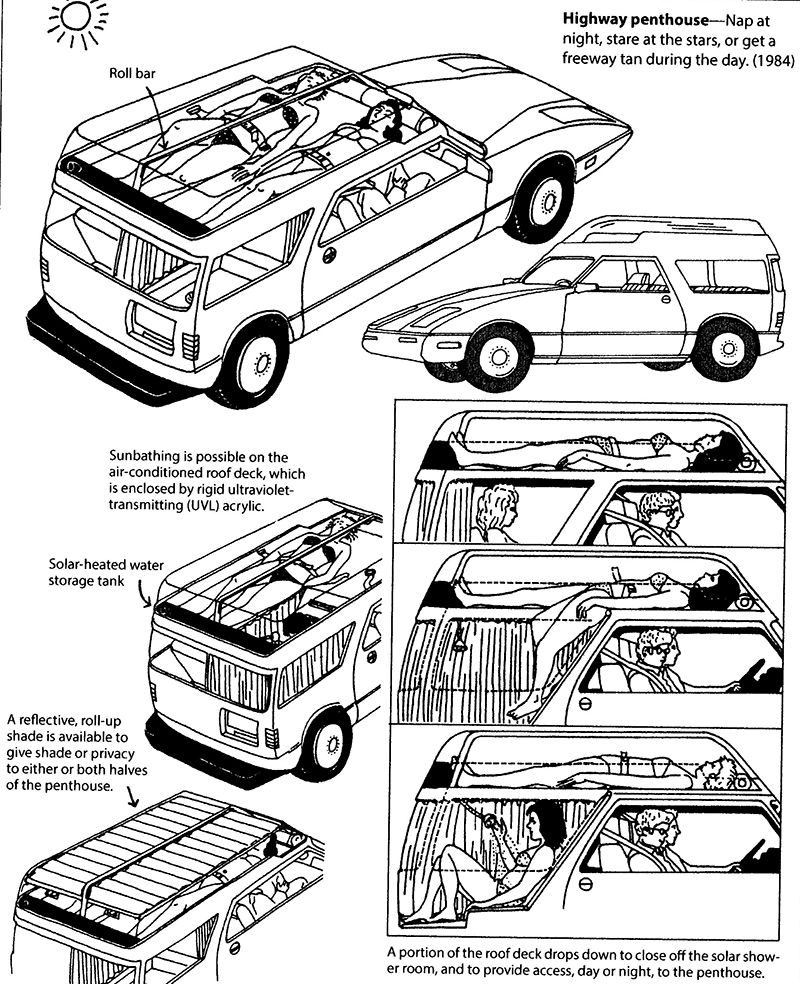
SH: You recently published, under your aptly titled Patent Depending Press imprint, Vehicles of the Imagination, which reveals some great dis-inventions like “Closet Cars” that are “adapted to the work and dating habits of Americans, especially young females.” Why would the world need this high speed closet?
SMJ: If one tracks the nation’s rapidly morphing cultural habits, it is possible to step back and figure out where a product might be needed or headed. For example, young women are under pressure to work at a job while looking good, staying fit, and engaging, while in the process of finding a companion. On the freeway every day, racing between job, babysitter, gym, and the possibility of staying overnight at a friend’s home, it is obvious that they need access to a full closet!
Yet, the world does not need any of my inventions. An article in the November, 2016 issue of New York Magazine proclaimed: “This Cartoonist Predicted Everything from Uber to Google Glass Back in, Like, 1991.” This is an accurate statement. The list of inventions I anticipated is rather large. Thomas Sullivan, a reporter for The Washington Times, reviewed Public Therapy Buses when it came out in 1991 and has been sending me emails ever since whenever he discovers a product or concept that I had anticipated. Examples are Kevlar-lined, vest/backpacks for school children, the Whole Mouth Dental Appliance, angry automobile styles, head-mounted cameras, and a vacuuming product that anticipated the Roomba.
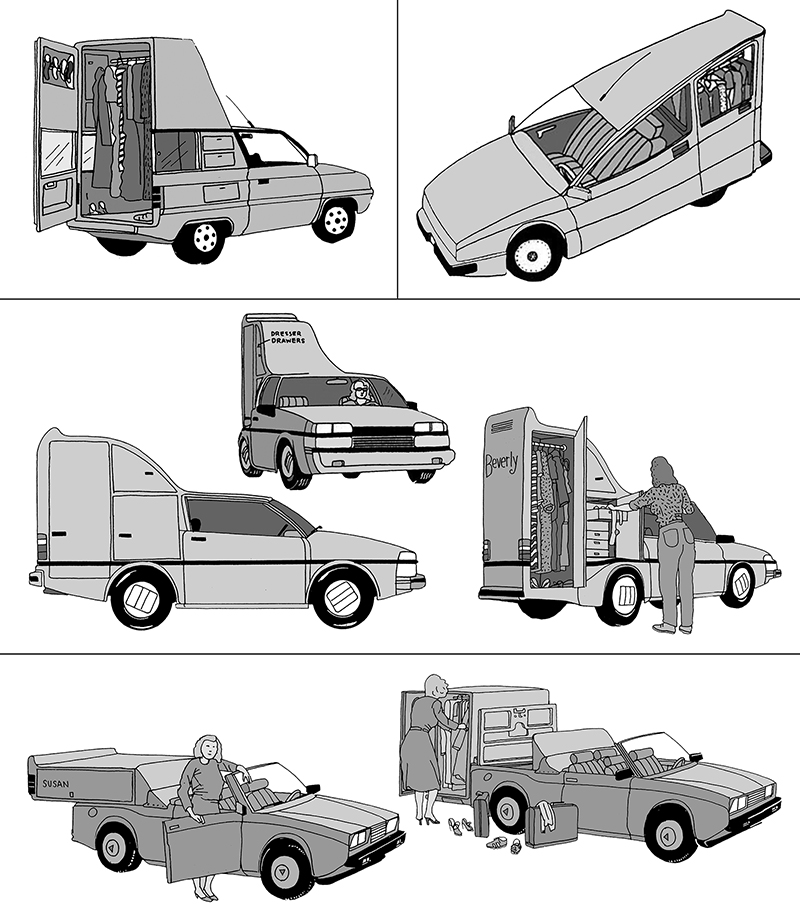
SH: Many of your car designs are transformative. I’m thinking of the “Cubicle Car” which docks with a main workstation so that work and commuting merge into one. How practical is this idea?
SMJ: I can think of nothing more impractical than my idea for the following reasons: 1) A large number of so-called knowledge workers are reportedly bored to death, and can’t wait to get home, when their “real” life begins. They don’t wish to be reminded that they work in a cubicle more than is necessary, 2) For a cubicle to be redesigned to meet national automotive standards for safety, and to be qualified for street use, it would need to be as heavy, costly, and as smelly as an actual car. Obviously, cubicle walls do not meet standards for side-impact collisions, and 3) One can imagine the mess that would result from in-office cubicle car collisions!
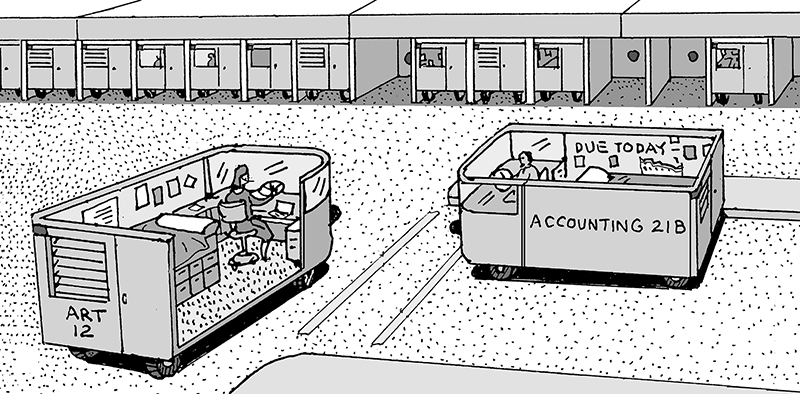
SH: I know you are concerned with greater efficiency and multitasking, so which of your inventions would provide the most opportunity for time saving?
SJ: There is perversity in my sense of humor. My BikeVest is a heavy wearable bicycle that would save time only if there happened to be an emergency requiring one to pedal somewhere immediately. But many of my inventions, as you note, deal with multi-tasking, but often the multi-tasking feature offers an awkward, incompatible, and unnecessary mix. I once designed and drew a combination coffee bean grinder and windup-powered radio, for example.
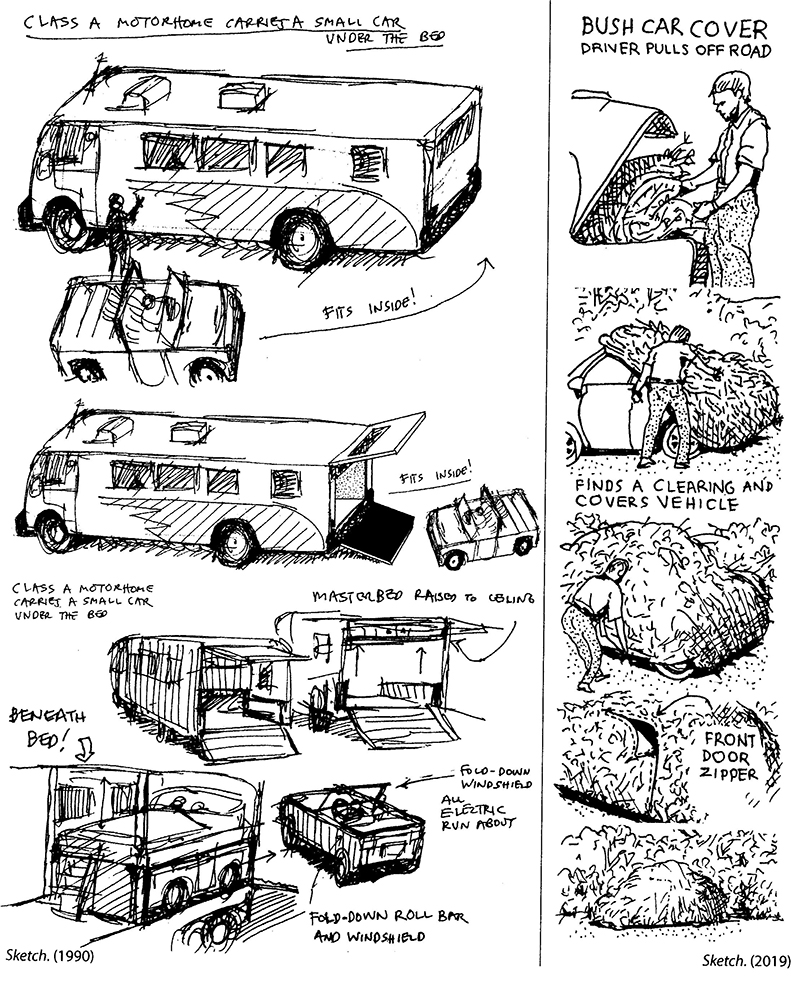
SH: You’ve also picked up where the great industrial designers of the pre-war “World of Tomorrow” generation left off. I’m thinking here about “The Freeway as Entertainment” section. Wouldn’t this be kind of dangerous to have fun while driving?
SMJ: Yes, that is the reason my product design work falls primarily in the humor category. As consumer-citizens we all experience irritation with fussy rules like those outlawing using a cellphone while driving. In a mood of rebellion I designed an actual automobile drafting board, arguing and even proving with examples that I am able to sketch while driving 80 mph on a quiet stretch of a freeway. Perversely, I worked on many designs for vehicles where you work out on the treadmill while also controlling steering, braking and acceleration with hand controls. The self-driving car will make it safe to operate a treadmill while driving, meaning my idea may come to fruition later.
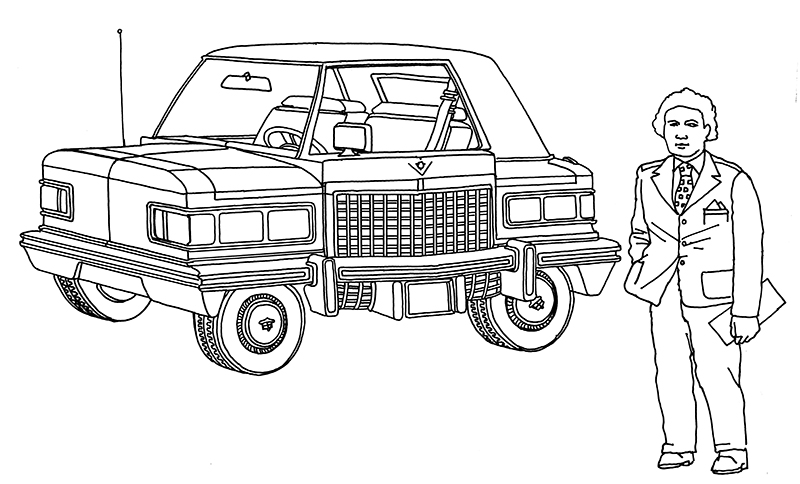
SH: Speaking of safety, your Two- and Three-wheeled Vehicles section proposes some fascinating possibilities, not always out of the realm of do-ability. Which among your concepts would you like to have produced?
SMJ: I am getting old. There will come a moment when earnest relatives will get up the nerve to tell me I should no longer be driving. But in the meantime, I would like to enjoy the safety of a Motorcycle Extender that would allow me to occupy a full freeway or street lane and not worry about being crowded.
SH: By the way, I’ve long hoped for a car with a waste capture (aka toilet). Any future possibilities?
SMJ: I appreciate the need for car toilets and have worked on some early concepts:
